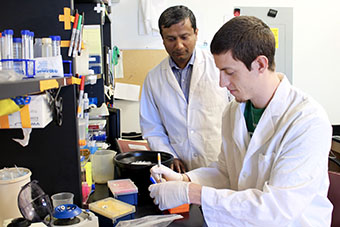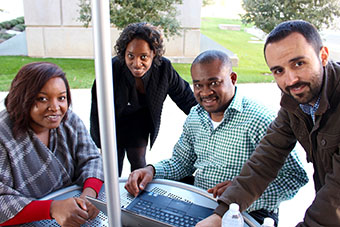Mentoring Models
This course focuses on the Traditional Mentoring model described below; however, other models of mentoring can also be considered, such as peer and group mentoring. Explore the different models by clicking on the images below.
Traditional Mentoring
Setting and Advantages
In a traditional mentoring relationship, less experienced researchers benefit from the guidance of more experienced investigators to acquire not only core scientific skills, but also the “untaught” competencies for navigating the training or work environment (e.g., becoming socialized to norms in the research team, developing productive collaborations, interacting with project officers at funding agencies). In this model, mentees benefit from the extensive knowledge, organizational wisdom, contacts, sponsorship, and experience that come from working with a senior colleague.
Potential Limitations
In traditional mentoring, challenges such as the following may arise:
- It may be difficult to find enough senior researchers with the time, experience, and willingness to serve as effective mentors.
- In this model, an implicit power differential exists between mentor and mentee, a situation that creates the potential for exploitation of the junior investigator as well as communication problems. For example, a mentee might refrain from asking a mentor for help to avoid appearing weak or imposing on the mentor’s time.
- Some mentors may strive, consciously or unconsciously, to maintain the status quo. They might have difficulty adapting their advice or mentoring approaches to mentees of different generations or backgrounds, or to changing institutional priorities or new trends in a research area.
Group Mentoring
Setting and Advantages
Researchers who are mentored via this approach may be exposed to multiple perspectives, rather than the views and experiences of a single mentor. It is also possible for spontaneous peer mentoring to occur, either formally or informally, among the mentee cohort. Group mentoring may be particularly helpful in environments with a limited number of senior members to fulfill the mentoring role.
Potential Limitations
In group mentoring, challenges such as the following may arise:
- Because researchers are mentored as a group, the content and format of mentoring interactions are more homogeneous and less individualized; the specific training gaps and professional development needs of an individual mentee might not be sufficiently addressed in this approach.
- Group dynamics need to be carefully managed.
- It may be difficult to coordinate the schedules of multiple mentors and mentees.
Peer Mentoring
Setting and Advantages
Whereas traditional and group mentoring are hierarchical, peer mentoring is based on mutuality. In this model, participants are colleagues at the same or similar levels of training or status. The absence of power differentials and likelihood of shared values, perspectives, and challenges among peers may promote a level of openness, empathy, and trust not readily achieved in traditional mentoring relationships. Creative problem solving and collaboration may also be enhanced. Peer mentoring is often considered a useful supplement to traditional mentoring, rather than a replacement. The peer model may be particularly beneficial for mid-career and more senior researchers, for example, to support a change in research focus or a transition to a leadership role in one’s institution.
Potential Limitations
In peer mentoring, challenges such as the following may arise:
- A major limitation to peer mentoring is the inability to leverage the knowledge and experience of more senior colleagues. The counsel of direct peers, while valuable, will lack the depth and breadth of advice provided by researchers who have already advanced in their careers or achieved a goal.
- Unless the mentoring group has a designated leader or administrative support, it may become challenging for peers to find the time to organize their mentoring interactions (create agendas, assign facilitators).
- Membership of the peer group may change, and be unpredictable.




